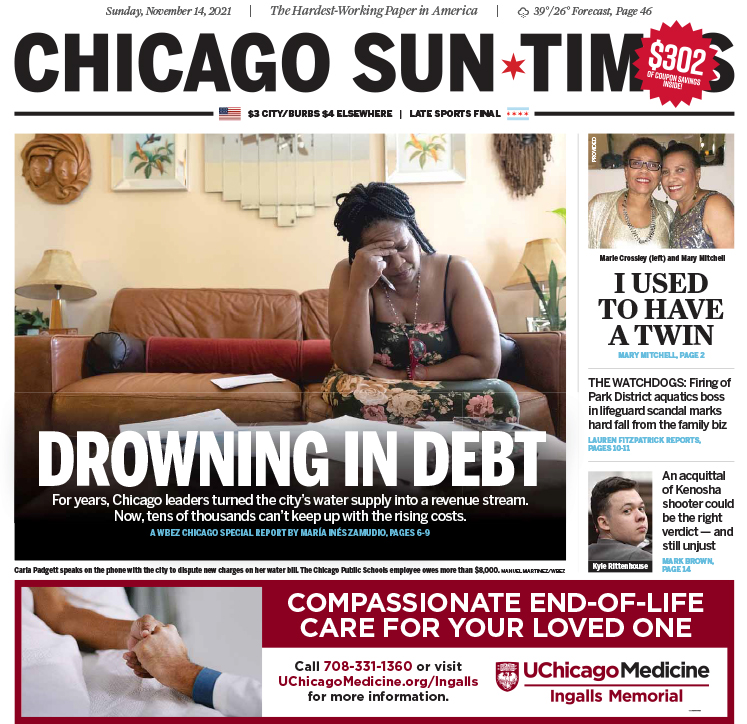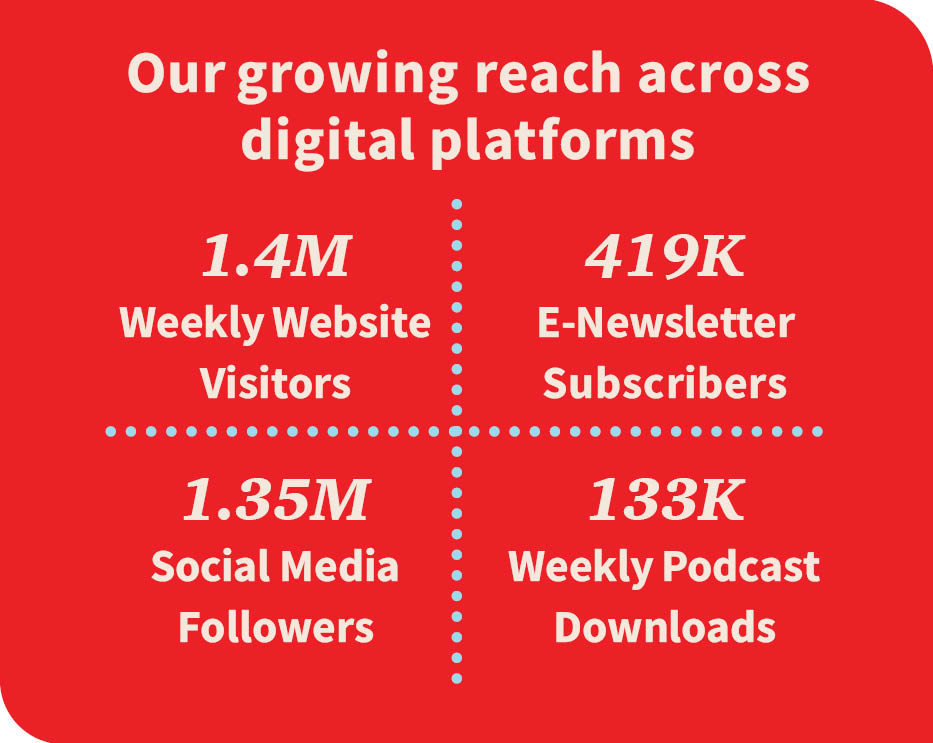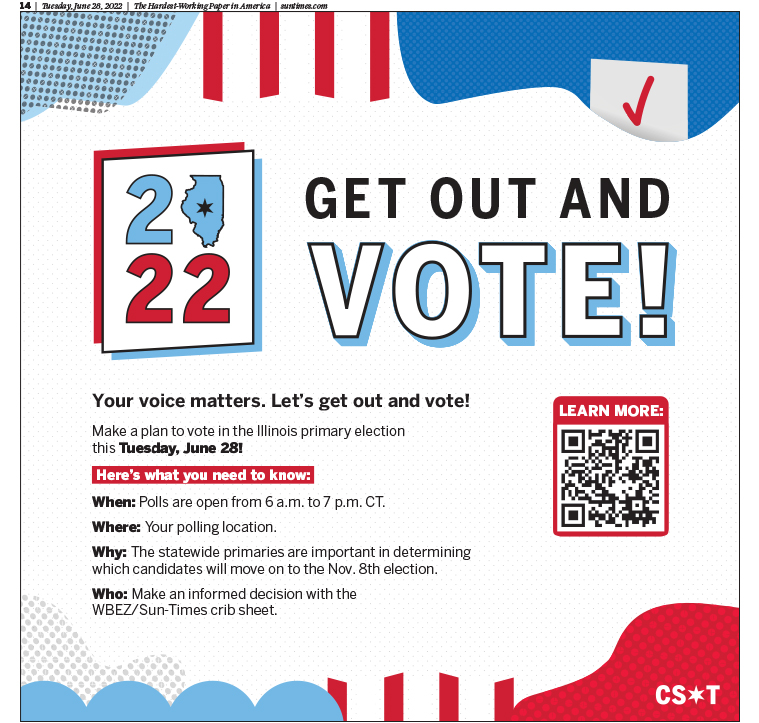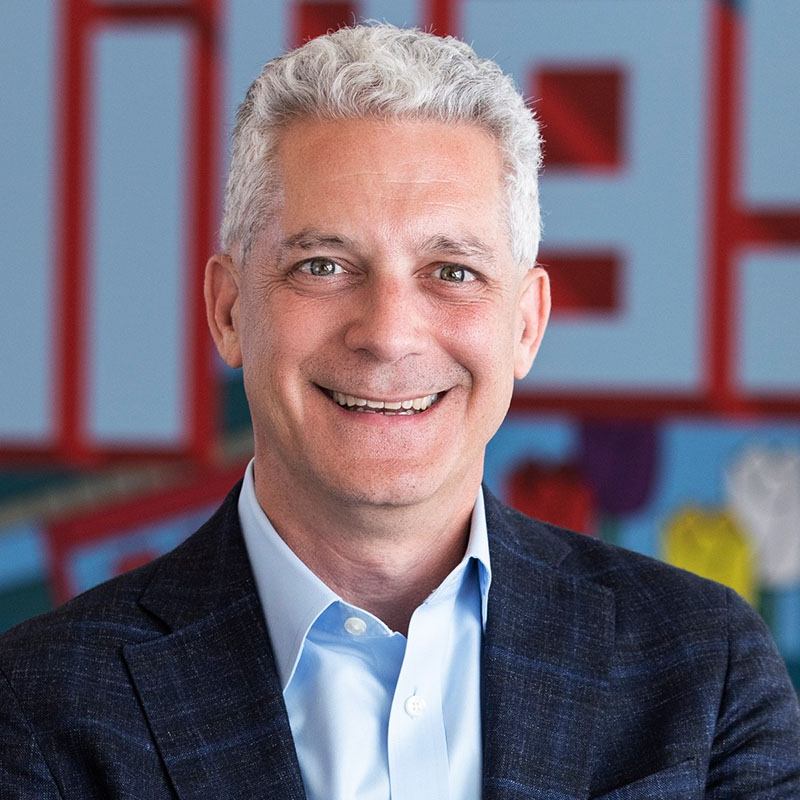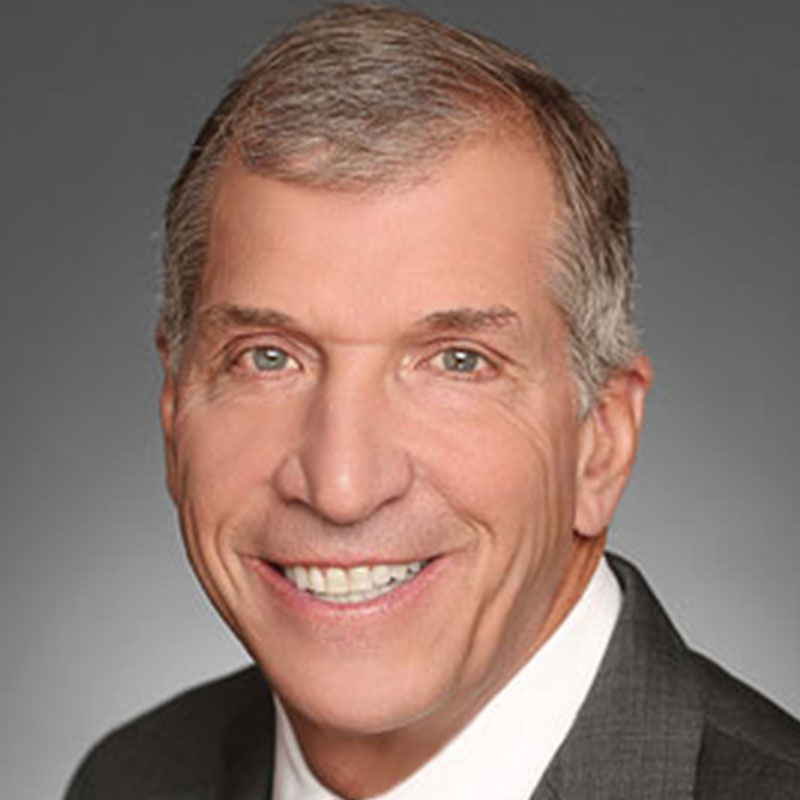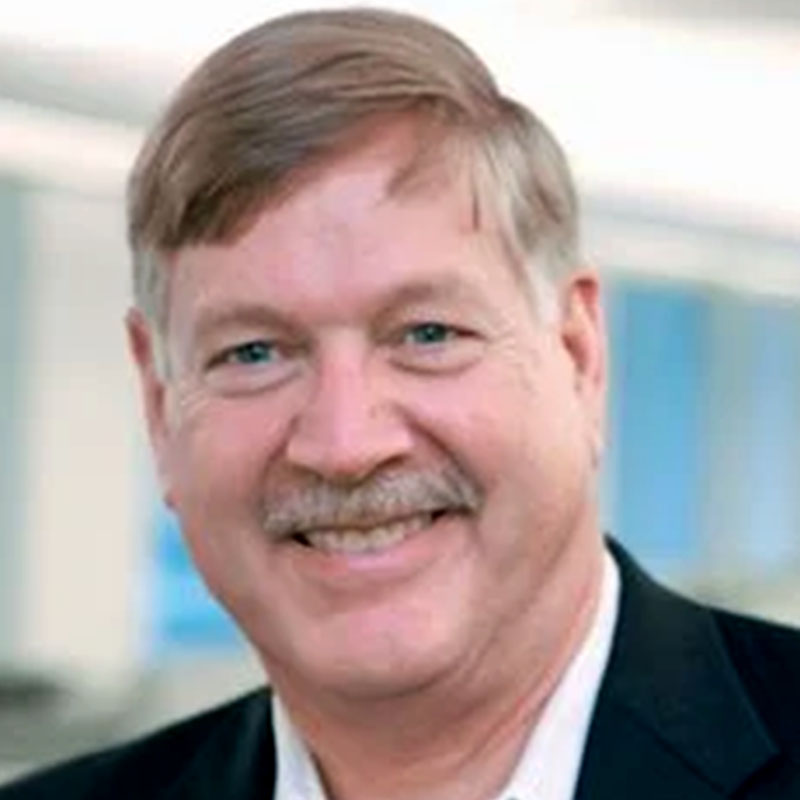Our Mission
Chicago Public Media is a nonprofit, mission-driven public media organization rooted in community and dedicated to serving our region across audio, digital, print, and events platforms. As home to WBEZ Chicago, the Chicago Sun-Times, and Vocalo, we are one of the largest nonprofit news organizations in the nation with award-winning journalists dedicated to serving our community. We amplify the public conversation by telling the stories that matter—stories that provoke thought, entertain, capture emotion, and inspire action.
Chicago Public Media is built upon a deep legacy of public service and innovation. WBEZ was established as an extension service of the Chicago Board of Education in 1943 and became one of the first charter member stations of National Public Radio in 1970. Throughout our history, we have been guided by an abiding commitment to serving our region as a leading source of news, storytelling, and cultural programming that connects Chicagoans to each other and to the world. Today, we are driving forward with a spirit of determination and innovation as we reimagine the future of local journalism in Chicago and beyond.
You—our community—are at the heart of what we do. It is only with your stories, your partnership, and your dedication to our mission that we can continue to deliver the highest quality news and programming each day. As we reflect on the past year, we are, above all else, grateful and humbled by the trust you place in us.
A New Story for Chicago
Declining capacity in local journalism, increasing partisan divide in national media, and the alarming rise of disinformation and misinformation pose a serious threat to democracy, civic engagement, and society at large. At Chicago Public Media, we firmly believe that access to fact-based, objective news and information is a right of every person, and we are determined to make high-quality, reliable journalism more widely available.
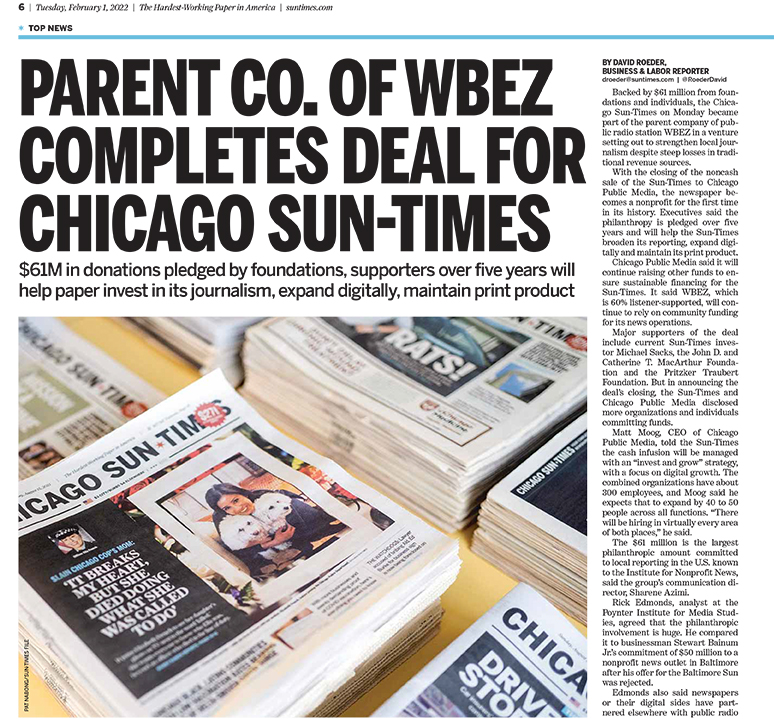
Your Support...
Connected Chicagoans
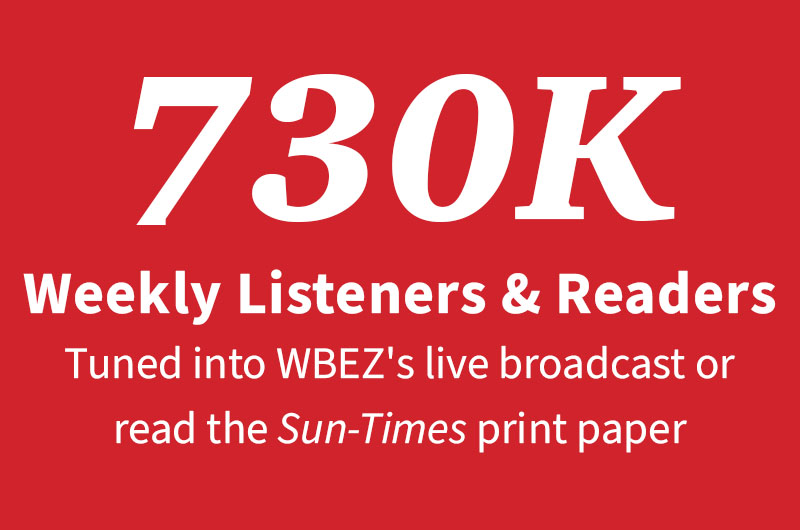
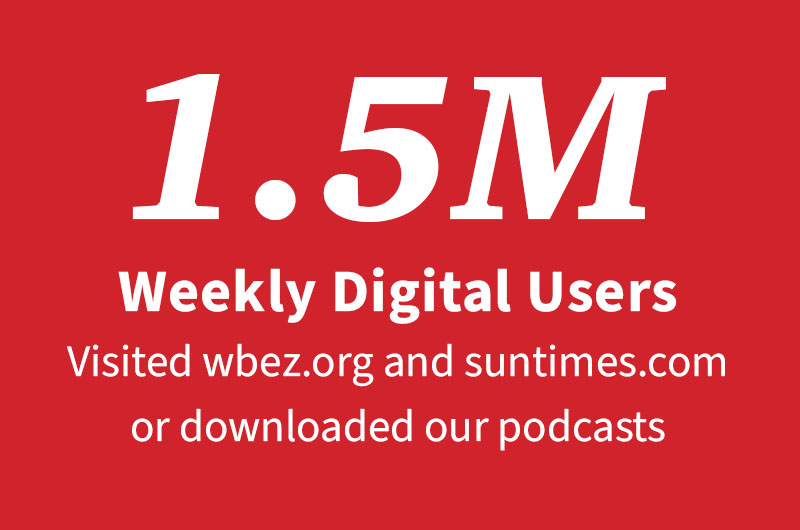
Inspired Excellence
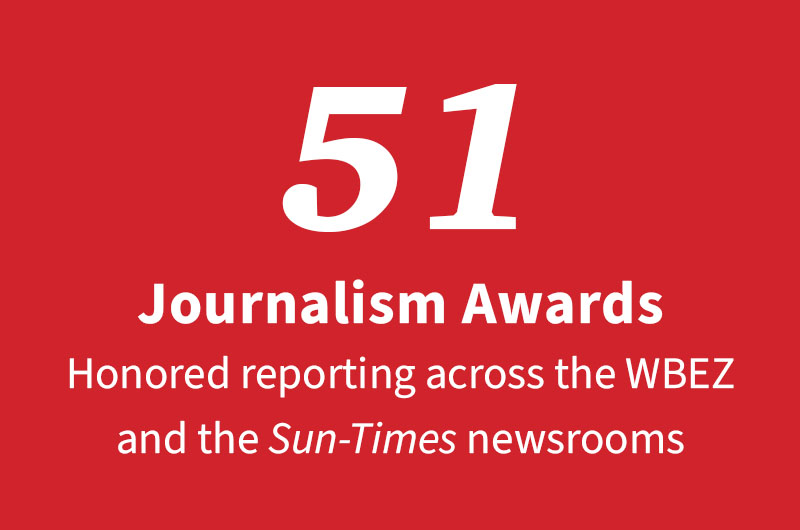
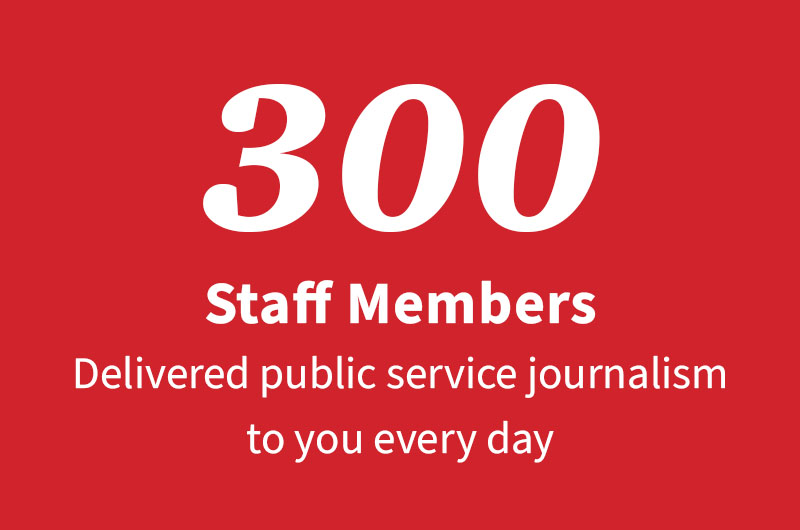
You have been here for us this year, so we can be here for you. With your support, we remain committed to learning, growing, and connecting with you so that we can better serve the community. Chicago Public Media gratefully recognizes the support of our Amplifier Circle members.
The Year In Review
Fiscal Year 2022, which spanned from July 2021 through June 2022, was a year of excellence for journalism that informed, illuminated, exposed, and entertained. Our reporting went beyond daily updates to uncover stories that might otherwise go untold to shine a light on the people who call this region home. While a single report cannot capture the full impact of our work, the highlights included here provide a glimpse of the breadth and depth of Chicago Public Media.
Amplifying Community Voices
With a history dating back to the creation of the Corporation for Public Broadcasting in 1967, one of public media’s core mandates is to produce programming “that addresses the needs of unserved and underserved audiences, particularly children and minorities.” As public media, we strive to include and serve the entire public.
Fulfilling that mandate is a great responsibility that we work to live up to every day. Our award-winning journalists and editors amplify community voices and produce stories that reflect the needs, interests, and hopes of our region. In the past year, voices from across the Chicagoland area were represented throughout our programming, from WBEZ’s Curious City podcasts and the Chicago Sun-Times op-ed pages to Vocalo’s public music submissions. We found new, innovative ways to connect with our community and produce journalism and storytelling that better reflects the experiences and perspectives of diverse communities. We began to build new teams and reimagine existing ones, such as a data journalism team and an expanded community engagement team, to help us to show up for, listen to, and engage our community. These growing areas present a meaningful opportunity to bring community members into the conversation more deeply and to engage with our reporting in new ways.
Air Quality Disparities
In the past year, we added new data and visual journalists to our team to promote greater understanding of people and institutions in visually engaging ways. The data team offers unique expertise in parsing complex data sets and making their findings accessible and interactive. In a stand-out, collaborative partnership between WBEZ, the Chicago Sun-Times, and MuckRock, we analyzed the findings of an eight month-data collection effort by Microsoft and Chicago’s Environmental Law and Policy Center that was designed to compare levels of air pollution by neighborhood. Using air quality sensors from a nonprofit called FieldKit, our reporters supplemented existing sensors with their own set, targeting neighborhoods that were previously overlooked near recently-opened Amazon and Ford plants on the South Side. Leveraging local partnerships, we teamed up with residents of Chicago's South Side and equipped them with air quality sensors to conduct daily readings.
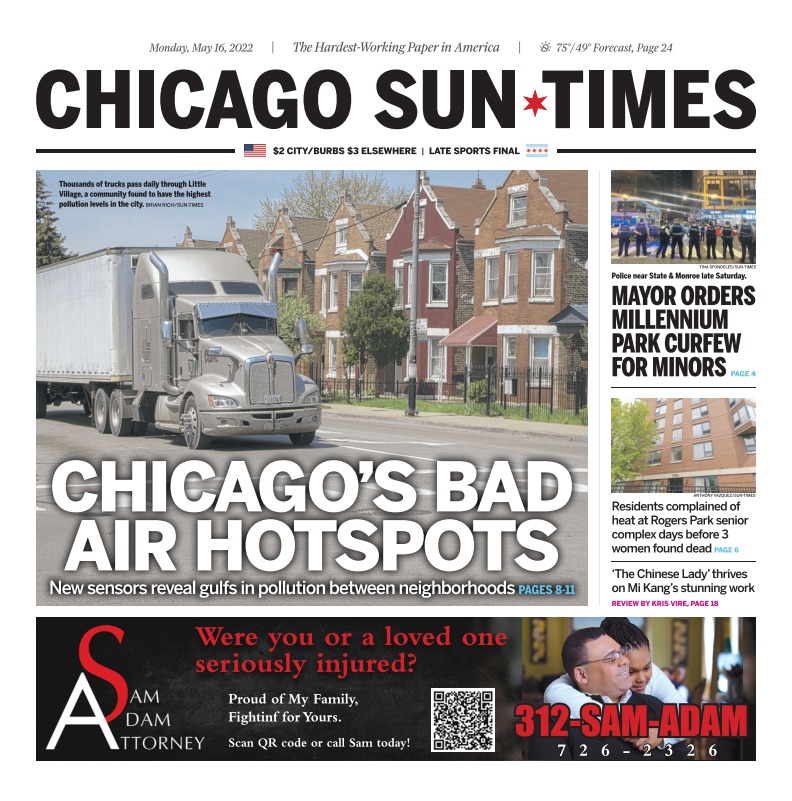
The investigation found that Chicagoans who live near heavy-traffic corridors breathe the most polluted air. Those corridors include Little Village, Austin, Englewood, and Irving Park. To help ensure that the findings were useful to our audience, the team transformed complex data sets into digestible visualizations depicting pollution levels across Chicagoland. With reporting partners in both newsrooms, the team worked with sources and experts on the ground to produce compelling narratives that cut through the data and noise to explore the real-world health impact of increasingly poor air quality.
Resetting the Conversation
WBEZ’s daily talk show, Reset with Sasha-Ann Simons, offers listeners a compelling mix of news and culture through engaging conversations with local artists, experts, journalists, and community members. Since its inception in 2019, Reset has helped us to connect more deeply with listeners and to make space for community conversations on the topics that matter most to our audience. The show’s format relies heavily on authentic engagement with listeners, who are encouraged to call in or join the conversation on social media, providing an opportunity for all of us to hear from and connect with one another. This year, the Reset team began livestreaming its Friday News Recaps, a segment that breaks down the biggest news of the week. The Friday News Recap live streams on Facebook and YouTube provide a new avenue to engage community members.
In the past year, as our community confronted significant challenges, from a nationwide baby formula shortage to the rise of the Omicron variant, Reset provided a reliable forum for critical information and community connection. Following Justice Alito's leaked opinion suggesting the Supreme Court would overturn Roe v. Wade in May, Reset host Sasha-Ann Simons spoke with legal experts, a bioethicist, medical providers, activists, and others to help provide context and analysis in the midst of widespread uncertainty. In one powerful segment, Sasha-Ann spoke with two women who chose to end their pregnancies, amplifying the experiences of people most directly affected by the ruling. In subsequent weeks, in the wake of the Supreme Court’s reversal of Roe, countless listeners called in to share their reactions, in many cases still processing the monumental decision in real time.
Holding Power to Account
In a city plagued with corruption and systemic inequities, we believe one of journalism’s most crucial roles is to expose unjust systems, illuminate their impact on real people, and present a range of possible solutions. We carry out that responsibility by providing the highest quality fact-based reporting and investigative journalism – the kind of news that not only informs but moves people to make more informed decisions, holds policymakers and politicians to account, and inspires change at the policy level. This requires in-depth, resource-intensive investigative reporting that can take months, and sometimes years, to provide context and clarity on the policies and systems that shape our daily lives.
We aim to inform and engage as many people as we can to increase public awareness and spur public dialogue on pressing issues facing our community. As a result of the WBEZ and Sun-Times partnership, we are uniquely positioned to bear this responsibility. Our broad reach across platforms deepens the impact of our journalism, as we share, expose, and promote content from both newsrooms.
Failing Systems
In one longform investigative series, the Chicago Sun-Times uncovered failures in the Cook County property tax system, including hundreds of thousands of dollars in unjustified tax breaks. This deep investigation provided context and analysis about complicated, bureaucratic systems, revealing how the tax breaks directly affect individual homeowners across Cook County, benefit those with wealth and power, and lead to systemic reliance on unjust practices. Following the investigation, reporters Tim Novak and Lauren FitzPatrick joined Sasha-Ann Simons on Reset to discuss their findings and take a deep dive into what could be behind the discrepancy in property tax evaluations.
This reporting prompted Cook County Assessor Fritz Kaegi to make meaningful changes to benefit residents of our region, including collecting a total of $254,298 in taxes for prior years of unjustified tax breaks. In addition, the assessor’s office relinquished a contentious case to the Cook County state’s attorney’s office to determine whether any laws were broken in wrongfully claiming the tax exemptions. Later in the year, Tim, Lauren, and digital analyst Caroline Hurley were honored by the National Headliner Awards with first place for local news beat coverage.
Drowning in Debt
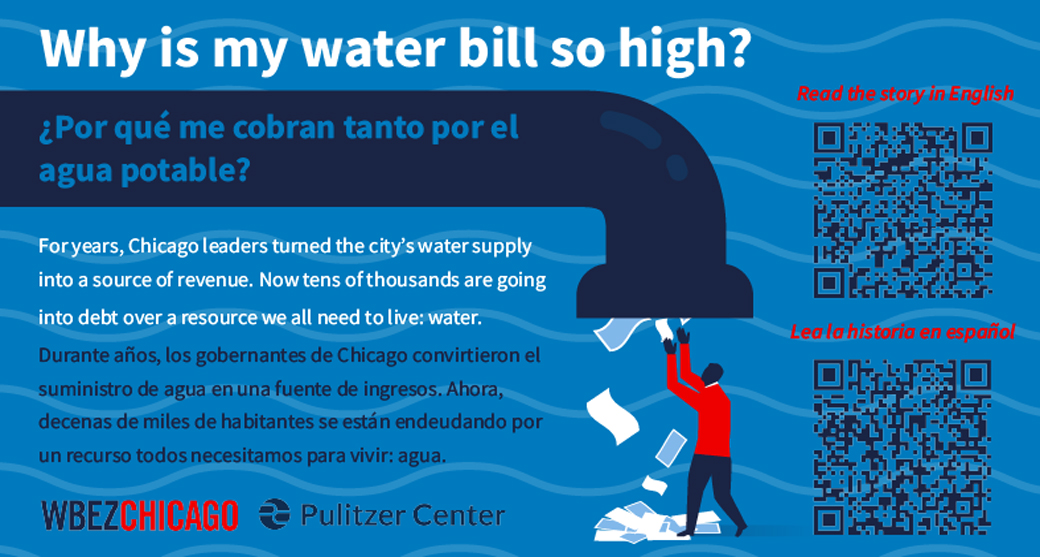
Engaging the Next Generation
As consumption habits change among news consumers, traditional modes of news delivery, such as newspapers and radio listening, have declined, in contrast with the growth of audio streaming services, podcasts, and smart speakers. These sweeping changes in media consumption are especially present among younger age groups. To achieve our public service mission in the 21st century, it is essential that we reliably show up with compelling stories on the platforms where audiences are seeking news and information. To that end, we are focused on digital innovation and transforming how we deliver our content in the digital space – on mobile apps, social media, e-newsletters, smart speakers, and podcasts – to bridge the divide between traditional news platforms and the digital world.
We are standing on the shoulders of those who came before us, just as we will enable the next generation to stand on ours. We believe it is our responsibility to engage young people, to be present on the platforms they frequent, and to produce in-depth, dimensional reporting that amplifies their voices. Furthering these efforts, we have taken steps to ensure that our staff reflects the diversity of our region in order to produce news coverage and storytelling that represents diverse lived experiences and resonates with a younger generation.
Telling Your Story
Vocalo, WBEZ’s sister station, produces broadcast, digital, and in-person programming at the intersection of arts, culture, and social change. Vocalo is a catalyst for discovery, expression, and participation, inspiring the next generation of creatives and changemakers. This year, Vocalo reintroduced Storyteller Workshops, a quarterly series that offers hands-on audio production experience to people who want to tell the stories of those making change in our community through creativity. The workshop is a free, eight-week program that equips participants with little to no audio experience with the technical skills necessary to produce, track, mix, design, and execute their audio story.
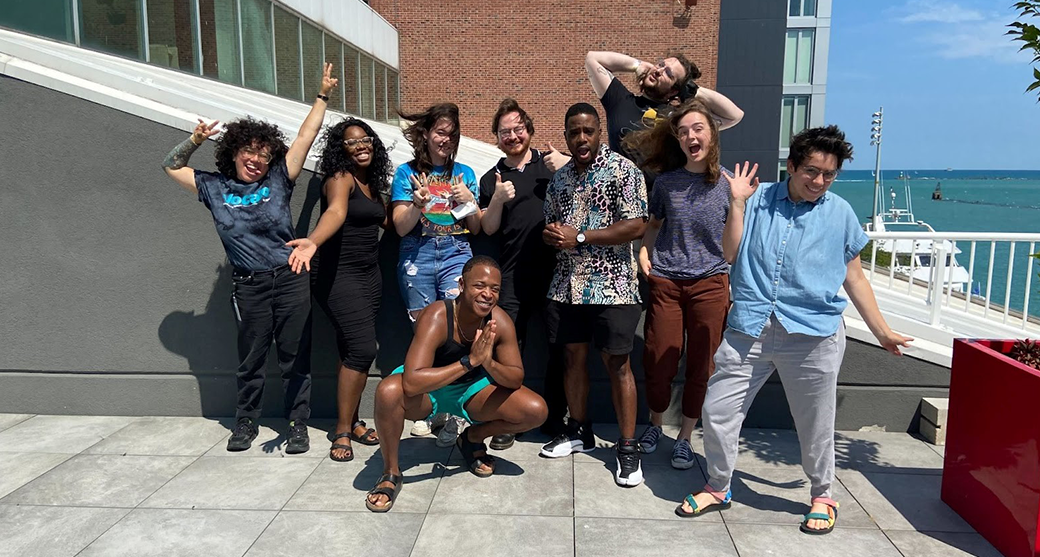
Small Town. Big Walls
According to the Edison Research Infinite Dial report, 38% of Americans – roughly 109 million people – reported having listened to a podcast in the last month, up from 14% a decade earlier. In the 12 to 34 age group, that number jumps to 50%. To meet this growing need for on-demand audio content, particularly among young people, WBEZ established a Content Development Unit to incubate, develop, and launch original podcasts in 2018. Since then, the team has delivered exceptional podcasts such as 16 Shots, Public Official A, and Making. This year, the podcast unit produced a new season of WBEZ’s investigative podcast, Motive, to take listeners inside one of the most closed institutions in the United States: Prisons.
Each Motive episode investigates the factors that shape conditions inside prisons, from the hidden world of prison towns to the deep-seated issues within prisons that go largely unseen. The podcast is a culmination of years of Shannon Heffernan’s investigative reporting on criminal justice for WBEZ. One episode, for example, tracked a pattern of beatings in a security camera blind spot, surfacing ten cases in which prisoners were beaten by guards. The powerful episode challenged listeners to ask why the pattern persisted despite red flags and to consider what happens when we choose not to see. In total, this season of Motive reached an estimated 4 million people through downloads and partnerships.
Inspiring Civic Engagement
From politics to education, entertainment to the environment, our local journalism allows individuals to engage with news and stories that are relevant to their daily lives. We believe that storytelling can serve as a pathway toward understanding and, in many cases, spur meaningful action. In an annual audience survey, we asked audience members what, if any, actions they have taken as a result of hearing or reading a WBEZ story. Here’s what we learned: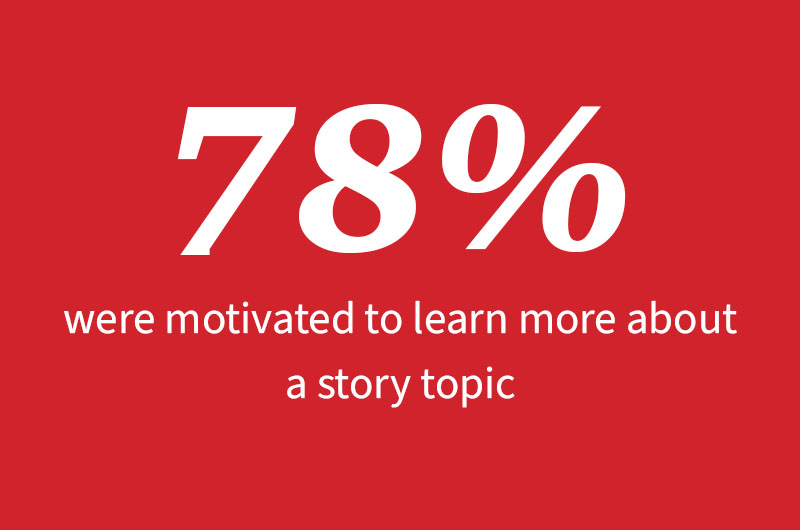
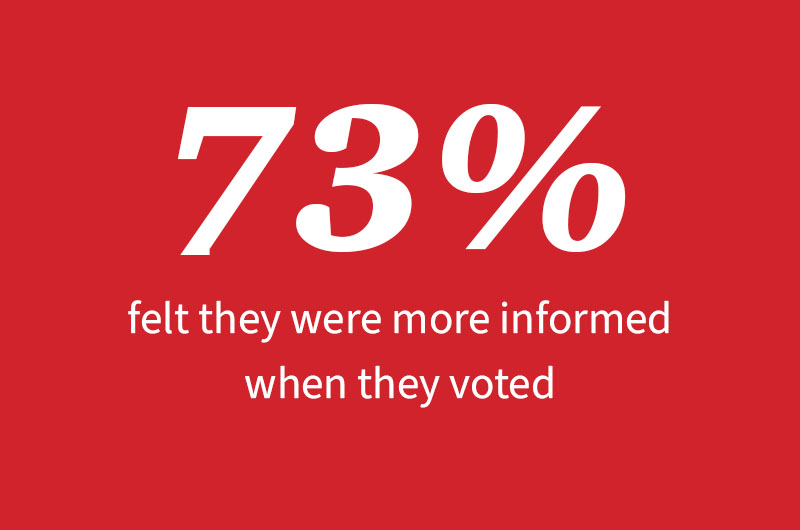
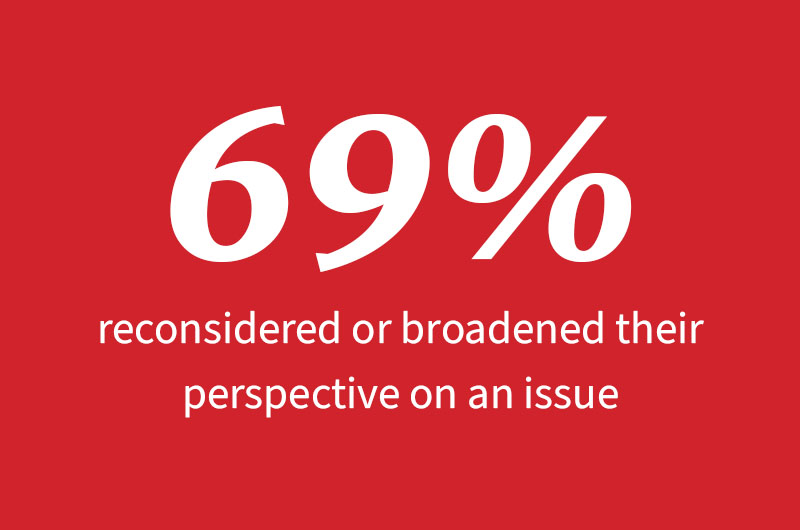
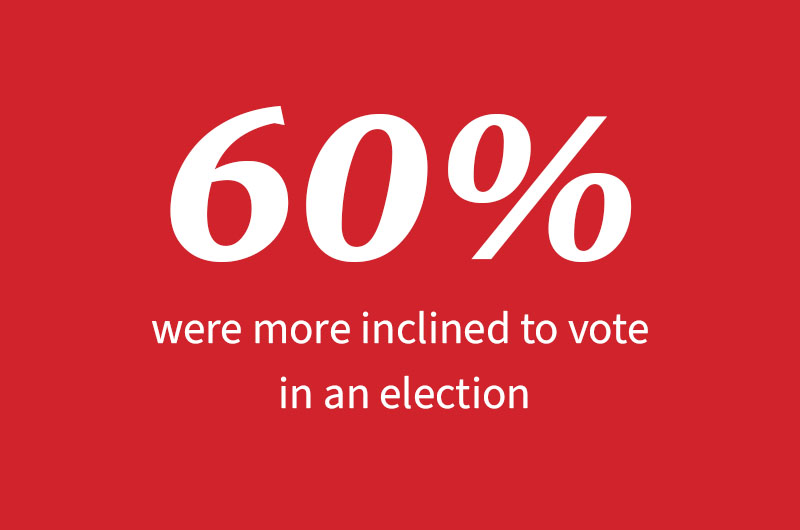
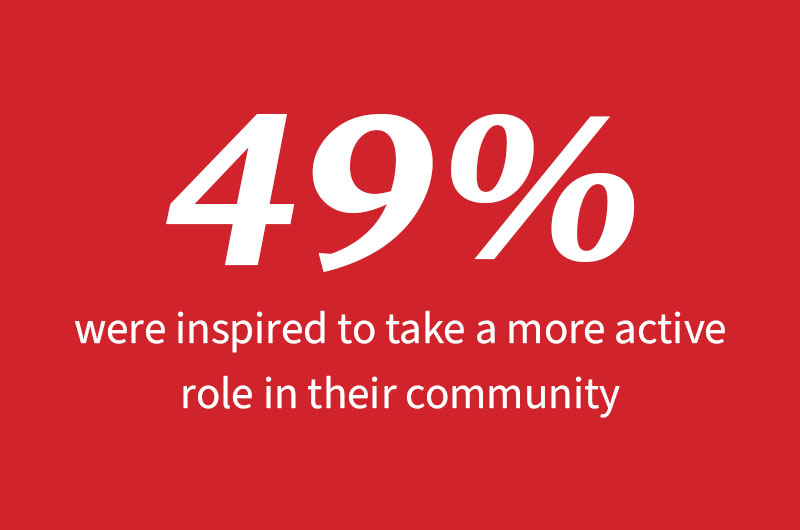
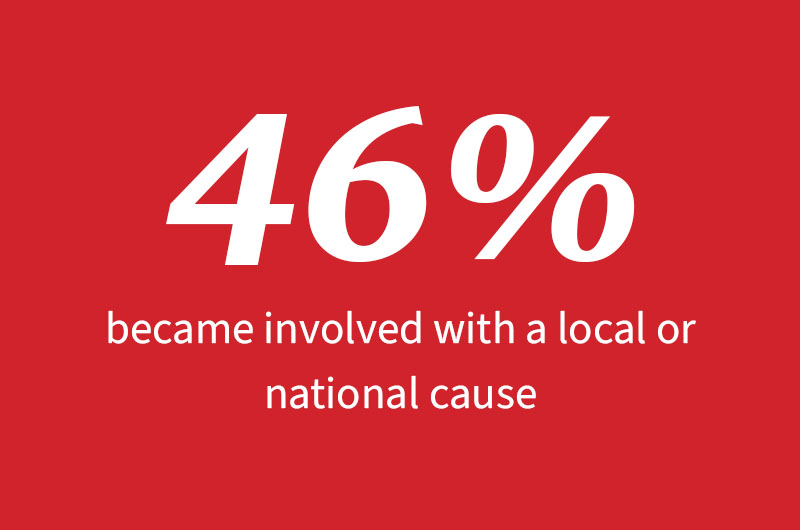
Staying Curious
Curious City began as a news experiment at WBEZ in 2012, pushing the limits of traditional norms within journalism and closing the gap between journalists and their audience. Curious City includes the public in editorial decision-making by inviting audience members to submit questions and vote on topics for further investigation. This process makes our journalism more transparent and strengthens our coverage of Chicago, the surrounding region, and its people – both past and present. Curious City is available as an on-demand podcast, and segments are regularly aired during our broadcast and featured on our daily talk show, Reset.
Curious City’s episodes address a wide range of audience questions, from what life is like in Chicago-area mobile home communities to explainers and multi-platform guides for informed voting. One installment this year sought answers about the closing of an Aldi store in the West Garfield neighborhood. In partnership with WBEZ reporters, Curious City interviewed residents about their feelings about the sudden closure and featured data about the lack of nutritional options in the area. The episode contextualized the complex and often opaque systems that undergird high-value corporate sales and grounded the conversation in the effect the closure had on the daily lives of West Garfield residents. The Curious City episode inspired further investigation into the future of the site and sparked a larger conversation about what residents can do to combat food insecurity on Chicago’s West Side.
Getting out the Vote
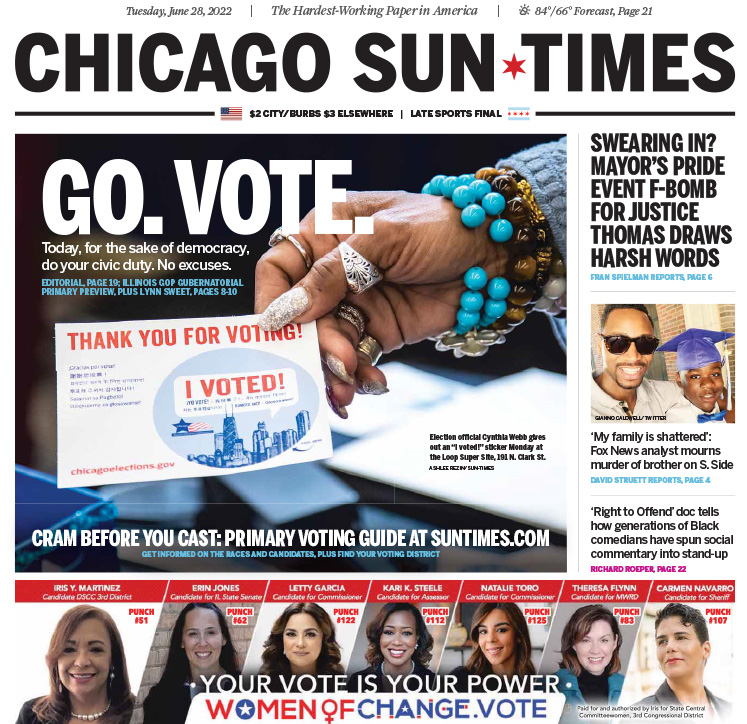
This year, the Illinois primary elections provided an opportunity for the most in-depth and consequential collaboration between the Sun-Times and WBEZ to date. Our newsrooms worked together from the outset to produce comprehensive election coverage. In the runup to the election, a Sun-Times/WBEZ poll revealed for the first time that Darren Bailey held a large lead over the presumed GOP gubernatorial frontrunner, Richard Irvin. The reporting was widely circulated in national coverage, appearing in the Washington Post, FiveThirtyEight, The Hill, NBC News, and Newsweek. The team also produced a voter guide to help people cast informed ballots. In total, the WBEZ and Sun-Times voter guide was used 198,000 times, translating to one out of four local voters. Our reporting was widely cited in national and local media outlets, extending the reach and helping more people cast informed ballots.
Acknowledgments
Our aspiration is to be the essential and most trusted news source that our community turns to each day. We promise to show up for you, to listen to you, and to amplify your stories. Thank you to the staff of WBEZ, the Sun-Times, and Vocalo who have dedicated their time and extraordinary talents to fulfilling that promise.
Our work is made possible by the generosity of our donors. To our first-time supporters, we are thrilled that you have joined us this year to help fuel quality, independent journalism. And to our long-time donors, your passion and dedication to Chicago Public Media sustains and inspires us every day. Together, your contributions support access to our journalism for all. That is what it means for us to be community supported, and we are so grateful that you are on this journey with us.
Chicago Public Media Leadership Team
Matt Moog
Chief Executive Officer, Chicago Public Media
Matt Moog is CEO of Chicago Public Media. He has more than 20 years of experience leading and scaling organizations and brings his civic leadership, commitment to local journalism, and significant experience in digital innovation to this role.
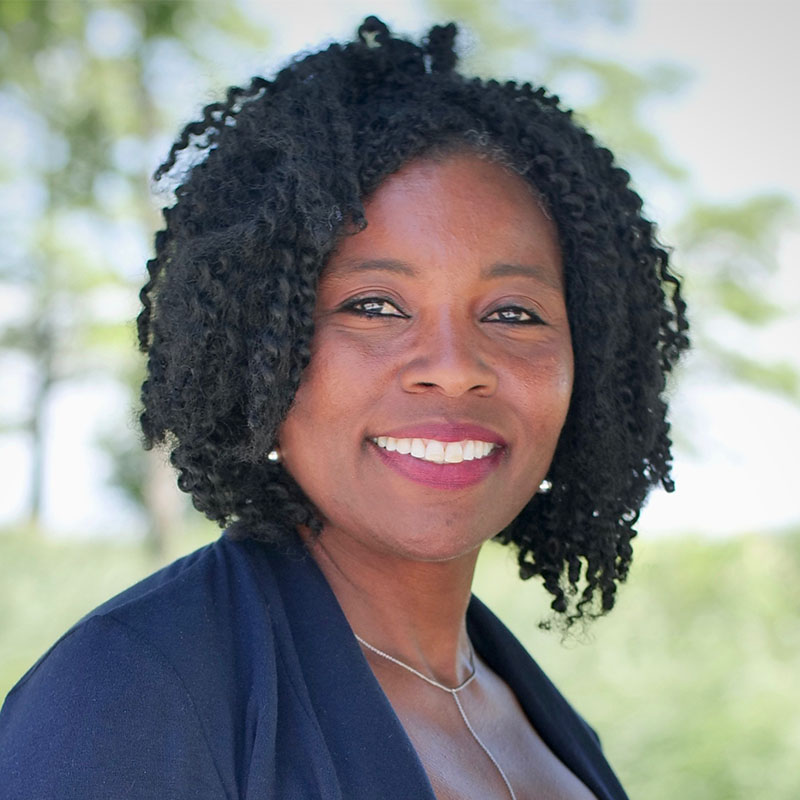 Tracy Brown
Tracy Brown
Chief Content Officer, WBEZ and Vocalo
Tracy Brown is Chicago Public Media’s Chief Content Officer, where she leads news operations and editorial decisions. Tracy has served as a newsroom leader and journalist for more than 25 years, with experience at award-winning newsrooms nationwide.
Chicago Public Media Board of Directors
- Bob Arthur*
- Steve Baird*
- Marcy Carlin
- Piyush Chaudhari, Chair
- Howard Conant Jr.
- Raymond E. Crossman, Ph.D.
- Thomas Fisher Jr., MD, MPH
- William A. Gee IV
- Kimberley Goode
- Bruce Heyman
- Roger Hochschild
- Priscilla Kersten*
- Adrienne King
- Lerry J. Knox, Jr.
- Charles A. Lewis
- Nivine Megahed, Ph.D., Treasurer
- Lisa Morrison Butler
- Sylvia Neil
- Kedra Newsom
- Robert Pasin, Vice Chair
- Julian Posada
- Sheli Rosenberg*
- Bill Rudnick
- Bryan Traubert*
- Dominique Jordan Turner*
- Bernardo Sichel
- Jessica Sieja
- Merrill Smith*
- Liz Thompson
- Laura Van Peenan
- Dilnaz A. Waraich, Secretary
*Directors who completed their service between July 1, 2021 and September 30, 2022
Chicago Public Media Lifetime Trustees
- Steve Baird
- Ken Lehman
- Kay McCurdy
- Bryan Traubert
In Recognition of Distinguished Board Service
Bryan Traubert
Lifetime Trustee
Bryan Traubert was elected to the Board of Directors in 2006 and completed his Board service in September. Bryan has filled multiple leadership roles during his time on the Board, including a significant tenure as Chair, during which he led CPM through the first year and a half of the COVID-19 pandemic. Bryan also presided over the Board during the diligence phase of the Sun-Times acquisition and played a vital role in making the acquisition a reality.
Steve Baird
Lifetime Trustee
Steve Baird was elected to the Board of Directors in 2007, concluding his service to the Board in September. During his time as a Director, Steve served in several leadership roles, culminating in his becoming the Chair of the Board from FY13 to FY15. Steve also led the search committee to hire former Chicago Public Media CEO Goli Sheikholeslami and served as the Chair of the Sound Impact Campaign, an effort that raised over $31 million to transform WBEZ into the organization it is today.
Financial Sustainability
As a nonprofit public media organization, we rely on a community of generous supporters to power and sustain our independent local journalism and storytelling. Thanks to the combined support of our members, major donors, and government, foundation, and corporate partners, we raised $30.4 million to fund our public service journalism in fiscal year 2022. Please see our annual financial reports for additional information.

